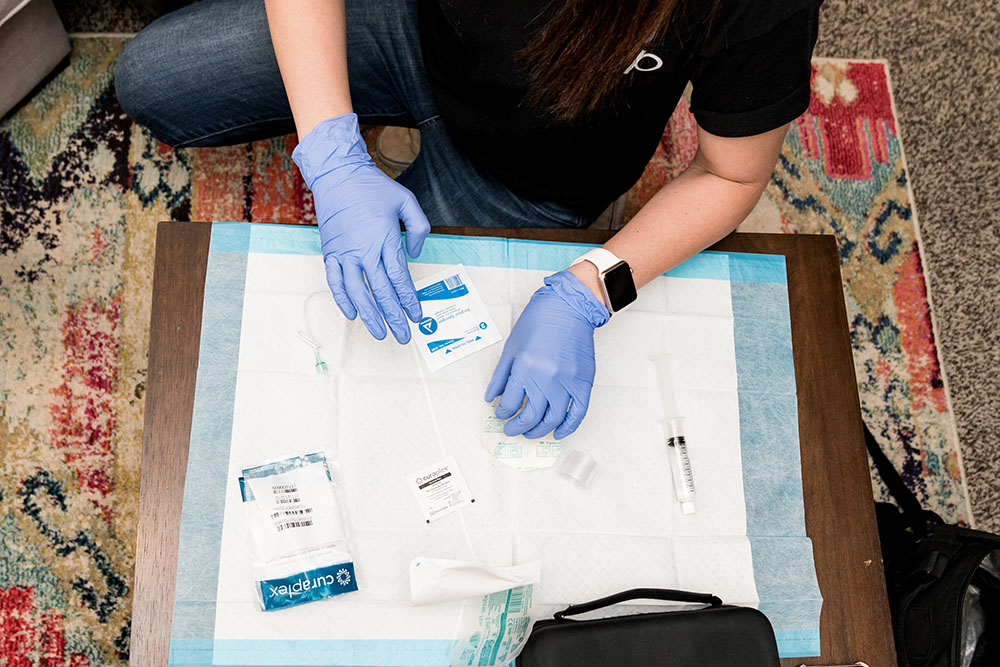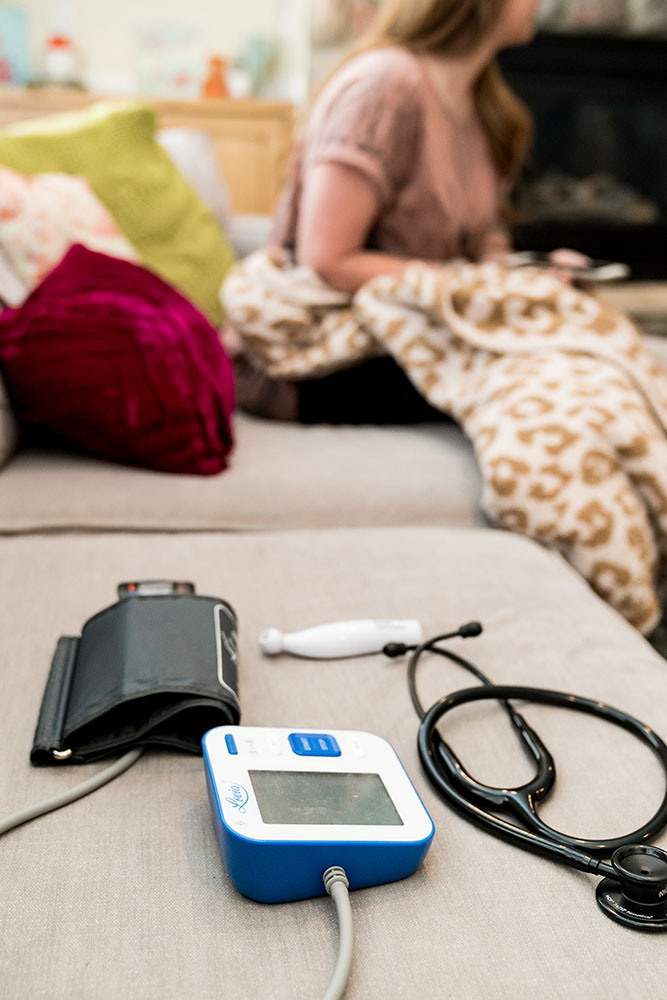You may have heard of IV therapy, but what is IV oxygen therapy? We will answer that question in this article as we explore the benefits and process of IV oxygen therapy (IOT) and in which cases it could be beneficial. Get your questions answered in the sections below and see if this may be a process that could be beneficial for you!

IV oxygen therapy is a specialized form of oxygen therapy designed to give people supplemental oxygen. This is especially needed when individuals experience respiratory limitations that don’t allow enough oxygen to reach their blood. Other forms of oxygen therapy include tubes placed in the lungs or a facemask that delivers oxygen. IV oxygen therapy is unique in that the O3 oxygen is added directly to the blood before being put back into the body. This method increases eosinophils, a white blood cell that boosts the immune system by fighting illness and disease.
This therapy is one that does not have a significant effect until multiple treatments have been administered. However, after multiple infusions, IV oxygen therapy can do wonders.
During an IOT session, small amounts of oxygen are administered at a low rate. Only around 2 percent of this oxygen dissolves in the blood, while the majority binds to hemoglobin in red blood cells. This is done as blood is extracted into a small container and the oxygen molecule is mixed in before being delivered back to the body through another tube.
One key aspect of IV oxygen therapy is opsonization. This is the process that enables the immune system to identify bubbles created by the remaining oxygen as foreign substances, triggering the production of eosinophils, which help in their elimination. This production of eosinophils, known as eosinophilia, is a key aspect of IV oxygen therapy’s mechanism of action.

IV Oxygen Therapy (IOT) offers several potential benefits, although it’s essential to consult with a healthcare professional before considering this treatment for specific health conditions. Here’s an elaboration on the benefits of IV oxygen therapy:
Reduction of Chronic Inflammation: Chronic inflammation can lead to various health problems, including autoimmune disorders, gastrointestinal issues, and skin conditions. IOT has been shown to help manage chronic inflammatory conditions by reducing tissue eosinophils and stimulating antioxidative enzymes. This can result in decreased inflammation and alleviation of related symptoms.
Support for Chronic Gastrointestinal Disorders: Conditions like Crohn’s disease and ulcerative colitis are characterized by chronic inflammation in the digestive tract. IV oxygen therapy may help manage these conditions by reducing inflammation, improving tissue eosinophil (white blood cell) levels, and enhancing antioxidative enzyme activity, ultimately providing relief from gastrointestinal symptoms.
Allergy Relief: Individuals experiencing acute or chronic allergic reactions, such as skin rashes, itching, or respiratory distress, may find relief with IOT. By addressing eosinophilia and promoting antioxidative enzyme production, IV oxygen therapy can mitigate the body’s allergic responses, leading to symptom improvement.
Stress Management: Chronic stress can contribute to fatigue and chronic inflammation. IOT can play a role in managing stress-related conditions by reducing oxidative stress, aiding in the body’s stress response, and promoting antioxidative mechanisms.
Antioxidant Support: IV oxygen therapy supports the body’s antioxidant defenses by increasing the activity of antioxidative enzymes like paraoxonase-1 and glutathione. This can help combat oxidative stress and reduce free radical damage.
Immune System Enhancement: The therapy indirectly enhances the immune system by stimulating eosinophilia (those white blood cells), leading to improved immune function. A stronger immune system can help the body fight off infections and illnesses more effectively.
Adjunctive Cancer Treatment: While not a standalone cancer treatment, IOT may serve as an adjunct therapy for cancer patients undergoing conventional treatments like chemotherapy. It can help manage treatment-related side effects, boost overall well-being, and support the body’s recovery.
Improved Circulation and Vasodilation: The production of substances during IV oxygen therapy can improve blood circulation, potentially benefiting cardiovascular health.
Holistic Wellness: IOT is often considered a holistic approach to wellness, focusing on the whole body rather than just treating isolated symptoms. It addresses the root causes of certain health issues, promoting overall vitality and well-being.

As listed above, there are a plethora of use cases for IV oxygen therapy. Here are just a few conditions where IV oxygen therapy can be a game changer.
Fibromyalgia: Fibromyalgia is a chronic pain condition characterized by widespread muscular and skeletal pain, fatigue, and tenderness in specific areas of the body. It often occurs with symptoms like sleep disturbances and mood issues. Managing fibromyalgia can be challenging due to its multifaceted nature. IV oxygen therapy (IOT) may offer potential benefits for individuals with fibromyalgia. By addressing chronic inflammation and promoting antioxidative enzyme activity, IOT can help mitigate some of the symptoms associated with fibromyalgia, such as pain and fatigue. While it’s not a standalone treatment, IOT can be considered as part of a holistic approach to managing fibromyalgia symptoms.
Eczema: Eczema is a chronic inflammatory skin condition characterized by redness, itching, and rashes. Chronic inflammation plays a significant role in eczema development and exacerbation. IOT may help manage eczema by reducing white blood cells and inflammation. The therapy’s impact on eosinophil levels can lead to less allergic and inflammatory responses in the skin, potentially providing relief for those who suffer from eczema.
Crohn’s Disease: Crohn’s disease is an inflammatory bowel disease (IBD) that causes chronic inflammation in the digestive tract. Symptoms include abdominal pain, diarrhea, and fatigue. IOT may be considered as an adjunctive therapy for Crohn’s disease management. By addressing chronic inflammatory responses and supporting antioxidative improvements, IOT can help reduce inflammation in the gastrointestinal tract, potentially leading to improved symptom control and overall well-being for individuals with Crohn’s disease.
FDA Regulation and Disclaimer: IV oxygen therapy must be administered by a registered nurse. Results may vary due to individual factors. This information is for guidance only and not a substitute for professional medical advice. Consult a healthcare provider for personalized recommendations based on your specific health needs before starting any vitamin infusion regimen. Your healthcare provider is your trusted source for informed healthcare decisions.

Drip Admin has written several informative articles and guides on the benefits of IV therapy, emphasizing the science behind the practice. Our writing style is engaging, concise, and accessible, making complex medical concepts easily understandable for readers.